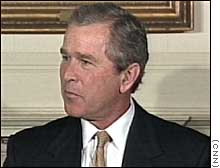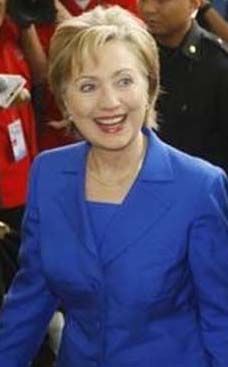
Our military carries out missions in more than 120 countries, and Americans give to charities far more than anyone else. Bush builds on this and has achieved great success in bringing much of the world in line with U.S. interests. The challenge of the rise of Germany, Russia, Turkey, China and India are all complex, but under Bush these are handled maturely and wisely. He also is maintaining our military lead in aircraft and in space. American world leadership under Bush is effective, strong and virtuous.
Joe Roche writes: Bush has presided over a pro-U.S. shift in the global community
Bush has presided over a pro-U.S. shift in the global community
Last week's Reaganesque speech by French President Nicolas Sarkozy was amazing. He was more admiring of our country than are many of our politicians. This demonstrates the reality of the strength and virtue of American world leadership under President Bush.
The 1990s witnessed the rise of Islamic terror, the flailing of Russia, the empowering of anti-U.S. leaders, and the bribing of many Europeans through United Nations corruption by tyrants. All is changed for the better. Under Bush the world is shifting decisively in line with U.S. interests.
The establishment last month of AFRICOM, the new U.S. military command focused on Africa, culminates a long effort. Africa was full of terrible conflict through the 1990s. Bush refined efforts to end war and build democratic societies. The results are good with AFRICOM allies in Morocco, Mali, Djibouti, Tanzania, Kenya, Cameroon, Equatorial Guinea, Ethiopia and Sao Tome & Principe all seeking U.S. bases. CIA Director Gen. Michael Hayden's visits to Morocco have found strong efforts against terror in the Arab Maghreb Union, with hope growing to end suffering in Sudan and Chad.
Libya is now our ally, while most wars have ended in Africa. Liberia's impressive leader, Africa's first female president, thanked Bush's "strong resolve" and "the artful diplomacy of the United States that was central to ending our long conflict."
Then she declared, "We will strive to be America's success story in Africa, demonstrating the potential in the transformation from war to peace; demonstrating the will to join in the global fight against terrorism; demonstrating that democracy can prevail."
Even U.N. Secretary-General Ban Ki-Moon, facing last week's trouble in Somalia, declined a peacekeeping mission, saying he'd rather see a U.S.- like "coalition of the willing."
In Asia, independent-minded Japan is remaining a strong ally, leading the advocacy for our National Missile Defense program. An alliance between us, Japan and Australia is forming with profound implications for regional peace and stability. Bush's approach to India is vital because a pro-U.S. shift in alignment will be profound in preventing war.
Bush has advanced a Responsible Stakeholder focus for Chinese foreign policy. We have also encircled China with what can be a future containment strategy. Our military performs many different missions in Asia, such as humanitarian operations in Cambodia.
Europe's pro-U.S. shift is stunning. Not only are Britain, Germany and France moving our way, but so are the Netherlands, Belgium, Austria and all of Central Europe. Finland and Sweden are advancing toward NATO membership.
Bush presided over NATO's largest expansion into the defunct Warsaw Pact in 2004, and now our National Missile Defense program is being sought by Poland, Romania and the Czech Republic. This enables vast advances in wartime missions, with the CIA conducting 100,000 operations a year and more than 1,200 rendition flights over Europe alone.
Colombia was about to fall to narco-terrorism in 2000, but is today stabilizing. Bush has built strong relationships with Brazil, Chile, Peru and Uruguay. The anti-U.S. Venezuelan president, Hugo Chavez, is thereby isolated.
Canada and Mexico have elected strong U.S.-allied conservative leaders. Though this gets lost in the immigration debate, President Felipe Calderon is fighting hard against drug cartels in Mexico. This is important.
Our military carries out missions in more than 120 countries, and Americans give to charities far more than anyone else. Bush builds on this and has achieved great success in bringing much of the world in line with U.S. interests. The challenge of the rise of Germany, Russia, Turkey, China and India are all complex, but under Bush these are handled maturely and wisely. He also is maintaining our military lead in aircraft and in space.
American world leadership under Bush is effective, strong and virtuous.












